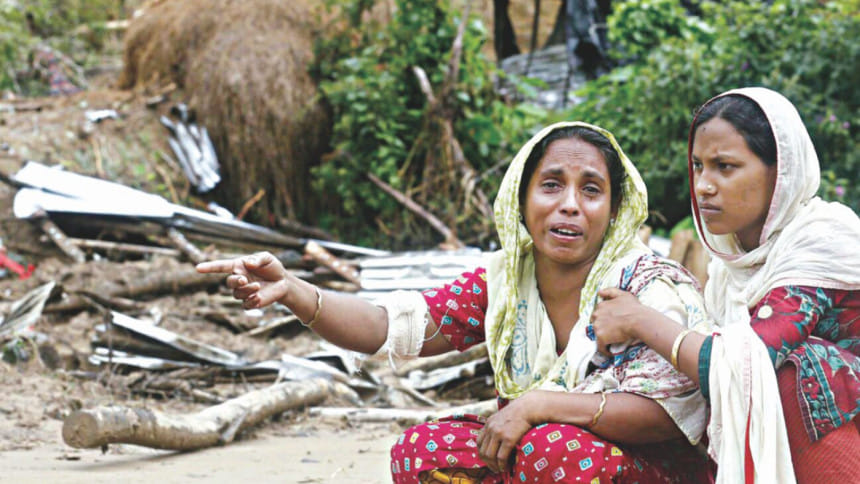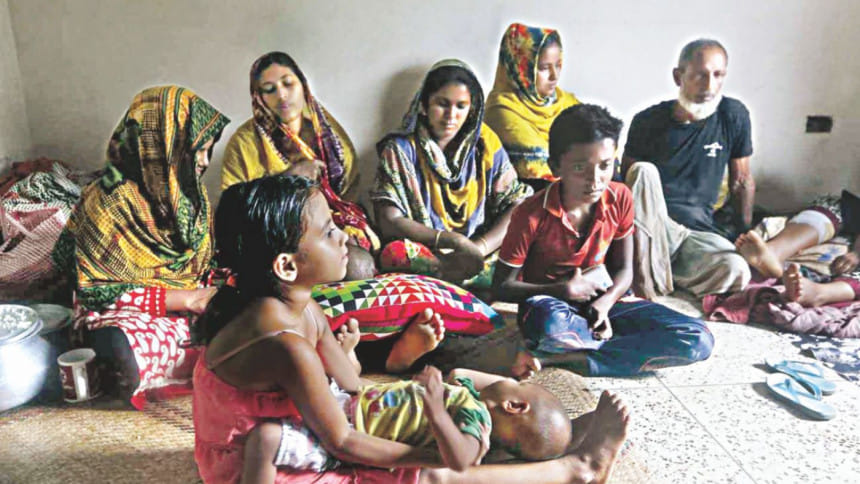Landslides Death toll 150: Call for rehabilitation, relief gets louder

Nur Nahar was sitting despondently on the second floor of Bangladesh Radio sub-station shelter centre yesterday afternoon. On her lap was a six-month-old boy, constantly crying. It was clear the baby has breathing difficulties.
"My grandson caught cold after getting drenched by the rain during the landslide,” said Nahar, 50.
She first took shelter at the passport office in Rangamati town on Tuesday following the country's deadliest landslide. There, a doctor examined her grandson and prescribed some medicines. But the centre didn't have those, and she didn't have any money to buy the drugs from outside.
Two days later, Nahar was relocated at the nearby Bangladesh Radio centre. “Here too, a doctor from the army came to see us but could not give us the medicines,” said the anxious grandmother.

But those living here are grateful that they are getting food on time. However, those at the town's Juba Unnayan shelter centre are not so lucky. Some 118 indigenous people have taken shelter there.
All of them were hungry when these correspondents went there around 5:30pm.
"We got no cooked food for lunch today. Around 2:30pm, some 20kg rice, four raw jackfruits, some chillis and onions were sent to the shelter centre.
We just finished cooking,” said Bikram Chakma, 50, who is from Udondi Adam Para.
Many of them said they got no food support from the government for the first three days following the landslide. During the period, they relied on the generosity of the neighbours who were not affected.
Amid such shortage of food, drinking water and medicines, demands for rehabilitation and extensive relief operation have grown louder in Rangamati, with landslide survivors living in dismal conditions in shelter centers for the last four days.
Victims and different groups have also intensified calls for the government to declare the district as a disaster area.
Official death toll in five districts in the region rose to 150 yesterday, with the recovery of four more bodies in Rangamati, the worst affected district with 112 confirmed deaths.
Although many are reported to be still missing, the district administration has wrapped up the search operations yesterday.
The district remains cut off from other parts of the country since Tuesday, when the tragedy struck following heavy downpour overnight.
Talking to The Daily Star, victims said they wanted the government to speed up the relief distribution, saying a disaster of this scale never happened in the hills before.
They also demanded that the government take urgent measures to prevent such tragedies in future.
These correspondents visited seven shelter centers and spoke with over 100 survivors. Most of them want immediate rehabilitation, saying they don't want to live in shelter centres for an indefinite period.
The food is not enough and there is an acute water crisis, they said.
They also need clothes and other necessary items, as they could not bring anything to the shelter centres.
"We have lost everything. Our homes are gone under the mud. I have come to the shelter centre with nothing but what I was wearing,” said Anu Begum, 60, at Bangladesh Radio shelter center where she now lives with her family.
Kazi Md Nurul Amin of Shimiltoli area called on the government to declare the district as a disaster zone and provide financial and other support so the victims can start all over again. Many echoed his call.
The district administration said they were doing all they could to meet the immediate needs of the victims.
The government has allocated corrugated tins and money for the affected people. But the district administration could not start the rehabilitation work as it is still raining, said Iftekhar Uddin Arafat, an executive magistrate.
"We got 500 bundles of tins and Tk 5 lakh for rehabilitation of the victims," said Iftekhar, also spokesperson of the district administration's disaster control room.
He added Tk 40 lakh and 200 tonnes of rice had been allocated for immediate relief efforts.
Meanwhile, fresh rain starting yesterday poses a risk of more landslides in the district, as the local administration warned people through loudspeakers to evacuate from risky homes at the hill slopes.

 For all latest news, follow The Daily Star's Google News channel.
For all latest news, follow The Daily Star's Google News channel. 



Comments